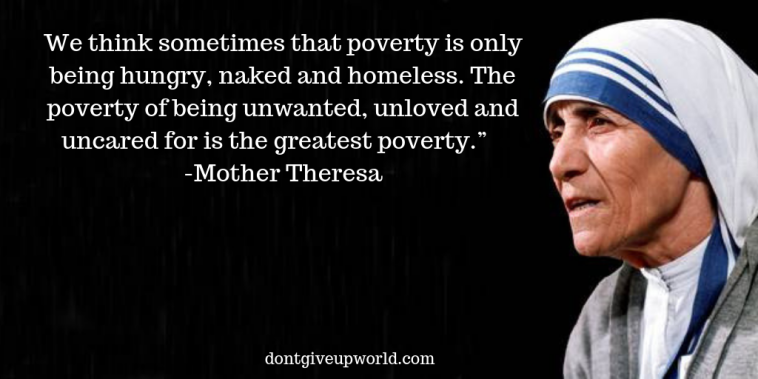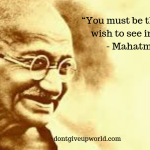
Quote on Poverty by Mother Teresa
We think sometimes that poverty is only being hungry,
naked and homeless. The poverty of being unwanted,
unloved and uncared for is the greatest poverty.”
– Mother Theresa
The Greatest Poverty: A Tale of Compassion and Hope
Introduction
In the bustling streets of Kolkata, where the sun’s rays barely penetrate the thick smog, lived a young girl named Ananya. Her tattered clothes clung to her fragile frame, and hunger gnawed at her insides. Poverty had stripped her of everything—except her dreams. Ananya believed that even in the darkest corners of existence, a glimmer of hope could ignite change.
The Hunger Within
Ananya’s days began with empty stomachs and hollow eyes. She scavenged for scraps, competing with stray dogs for morsels. The city’s indifference weighed heavily on her heart. She wondered, “Is this all life has to offer? Is poverty merely about hunger?”
The Unwanted Heart
Ananya’s loneliness was palpable. She longed for warmth—a touch, a smile, anything that would remind her she was not invisible. But the world turned away, dismissing her as unwanted. She clung to the memory of her mother’s embrace, the only solace she had ever known.
The Unloved Soul
In the orphanage, Ananya met Sister Maria, a beacon of compassion. Sister Maria’s eyes held stories of countless lives she had touched. She whispered, “Child, poverty isn’t just empty bellies. It’s the ache of unloved souls.” Ananya listened, her heart absorbing every word.
The Uncared-For Spirit
Sister Maria’s shelter became Ananya’s refuge. Here, she found more than food and shelter; she found love. The nuns cared for her wounds, both visible and hidden. They taught her to read, to dream beyond survival. Ananya blossomed, her spirit no longer uncared-for.
The Journey of Transformation
Ananya’s metamorphosis was gradual. She learned to mend her own wounds and those of others. She became a voice for the voiceless, advocating for education, healthcare, and dignity. Her passion ignited a movement—a ripple that spread across the city.
Conclusion
Ananya understood that poverty wasn’t just about hunger, nakedness, or homelessness. It was about the absence of love, care, and belonging. She vowed to be the change she sought. As she stood before a crowd, her eyes alight with purpose, she quoted Mother Teresa: “We think sometimes that poverty is only being hungry, naked and homeless. The poverty of being unwanted, unloved and uncared for is the greatest poverty.” Ananya’s story echoed through the streets, inspiring others to see beyond material deprivation.
For More Info Click Here
More Such Article Click Here




GIPHY App Key not set. Please check settings